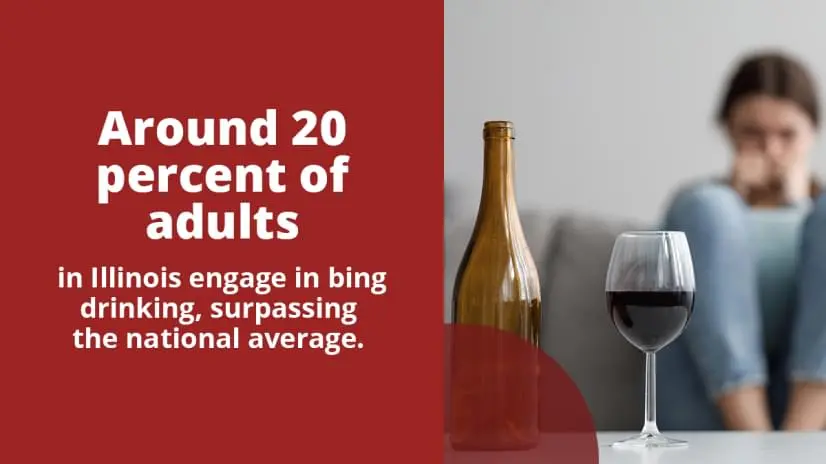
Drug And Alcohol Detox Near Aurora, Illinois
Clinically Reviewed by:
Alcohol rehab centers provide support and treatment for individuals struggling with alcohol abuse or addiction. These facilities offer various therapies, counseling, and medical assistance tailored to each person’s needs.

Key Takeaways
Alcohol rehab centers support individuals battling alcohol abuse or addiction. Here’s what you need to know:
- In Illinois, approximately seven percent of adults struggle with AUD, according to recent surveys.
- Alcohol rehab is a specialized program designed to help individuals overcome alcohol abuse and regain control of their lives.
- Trust your instincts and choose a rehab center where you feel comfortable and supported in your journey toward sobriety.
Indiana Center for Recovery offers personalized treatment and compassionate care for individuals seeking freedom from alcohol addiction.
Prevalence of Alcohol Abuse in Illinois
Alcohol abuse is a concerning issue in Illinois, with a significant number of residents affected. According to statistics, around 20 percent of adults in Illinois engage in binge drinking, surpassing the national average. Binge drinking is defined as consuming excessive alcohol in a short period, leading to various health and social problems.
Additionally, alcohol-related deaths and hospitalizations remain high in the state, highlighting the severity of the problem. Efforts to address alcohol abuse in Illinois include awareness campaigns, community programs, and access to treatment services.
Illinois Statistics on Alcohol Use Disorder
In Illinois, around 1 in 12 adults suffer from alcohol use disorder (AUD). It means difficulty controlling alcohol use despite negative consequences. According to the National Institute on Alcohol Abuse and Alcoholism (NIAAA), AUD affects about 8.5 percent of Illinois adults.
AUD can lead to various health complications, including liver disease, mental health disorders, and relationship problems. Seeking help for AUD is vital, and Illinois offers a range of treatment options, including therapy, support groups, and medication, to support individuals in their recovery journey.
Relationship of Alcohol Abuse with Mental Health in Illinois
Alcohol abuse often coexists with mental health issues in Illinois, exacerbating the challenges faced by individuals. Studies indicate a strong correlation between alcohol use and mental health disorders like depression, anxiety, and post-traumatic stress disorder (PTSD). Many individuals turn to alcohol as a way to cope with underlying psychological distress, leading to a vicious cycle of dependency and declining mental health symptoms.
Addressing both alcohol abuse and mental health concerns together is essential for effective treatment and recovery. Integrated treatment approaches in Illinois focus on addressing these dual diagnoses to improve overall well-being and quality of life.
Alcohol Rehab: Explained
Alcohol rehab is a specialized program designed to help individuals overcome alcohol abuse and regain control of their lives. These programs offer a structured atmosphere where individuals receive medical, psychological, and emotional support to address their alcohol-related issues.
Rehab typically involves detoxification, therapy sessions, counseling, and aftercare planning to prevent relapse. By participating in alcohol rehab, individuals can learn coping mechanisms, develop healthier habits, and rebuild their lives free from alcohol dependence.
Impact of Alcohol on the Body
Alcohol can leave marks on the body, affecting various organs and systems. Excessive alcohol use can lead to liver damage, including fatty liver, hepatitis, and cirrhosis. It also drains the immune system, making individuals more susceptible to infections and diseases.
Moreover, alcohol abuse increases the risk of cardiovascular problems such as high blood pressure, heart disease, and stroke. Additionally, prolonged alcohol use can impair brain function, leading to memory loss, cognitive deficits, and mental health disorders.
Importance of Alcohol Rehab
Alcohol rehab plays an integral role in helping people free from the cycle of alcohol abuse and its negative consequences. Rehab programs provide a supportive and structured atmosphere where individuals can address the underlying issues contributing to their alcohol dependency.
Through therapy, counseling, and support groups, individuals learn to forge healthier coping mechanisms, manage cravings, and rebuild relationships damaged by alcohol abuse. Moreover, rehab equips individuals with the skills and tactics needed to maintain sobriety in the long term, leading to improved overall health and well-being.
Alcohol Rehab Programs
Alcohol rehab programs offer various treatment options for individuals struggling with alcohol abuse or addiction. These programs provide multiple services, including therapy, counseling, medical support, and aftercare planning.
The goal is to help individuals overcome alcohol dependency and lead healthier, sober lives. Rehab programs may vary in duration, intensity, and approach, catering to the diverse needs of individuals seeking treatment for alcohol-related issues.
Inpatient Alcohol Rehab Programs
Inpatient alcohol rehab programs provide intensive, round-the-clock care for individuals with severe alcohol addiction. Depending on their needs, patients reside at the treatment facility for the program’s duration, typically 30 to 90 days or longer.
Inpatient rehab offers a structured atmosphere where patients receive medical detoxification, therapy sessions, counseling, and support from healthcare professionals. This immersive approach allows people to focus only on their recovery without distractions from the outside world, increasing the likelihood of successful outcomes.
Outpatient Alcohol Rehab Programs
Outpatient alcohol rehab programs offer flexibility for individuals who cannot commit to a residential treatment program or have completed inpatient rehab and require ongoing support. Patients attend scheduled therapy sessions, counseling, and group meetings while living at home or in a sober living environment.
Outpatient rehab allows individuals to continue with their daily responsibilities, such as work or school, while receiving treatment for alcohol abuse. This option is suitable for those with milder forms of alcohol addiction or as a step-down from inpatient rehab.
Twelve-Step Programs in Illinois
Twelve-step programs, such as Alcoholics Anonymous (AA), are widely available in Illinois and provide a supportive community for individuals recovering from alcohol addiction. These programs follow a structured approach based on twelve guiding principles to achieve and maintain sobriety.
Meetings are held regularly, allowing members to share their experiences, receive peer support, and work through the steps with the guidance of a sponsor. Twelve-step programs stress personal responsibility, accountability, and spiritual growth, offering a comprehensive framework for long-term recovery from alcohol addiction.
How to Choose the Right Alcohol Rehab Facility
Choosing the right alcohol rehab facility is crucial for a successful recovery journey. Start by assessing your needs and preferences. Explore different rehab centers and their programs to find one that aligns with your goals. Consider location, treatment approaches, amenities, and success rates.
Additionally, try to read reviews and testimonials from previous clients to get insights into the quality of care provided. Tour the facility and ask questions to ensure it meets your expectations. Ultimately, trust your instincts and choose a rehab center where you feel comfortable and supported in your journey toward sobriety.
Frequently Asked Questions (FAQ)
The rehab phase of recovery involves various therapies, including cognitive behavioral therapy (CBT), which helps individuals address underlying issues contributing to addiction. In the state of Illinois, rehab programs often integrate CBT alongside other evidence-based treatments.
The programs are regulated and sometimes funded by entities like the Substance Abuse and Mental Health Services Administration (SAMHSA). They provide comprehensive disorder treatment, addressing both physical and psychological aspects of addiction.
Through counseling and therapy sessions, individuals learn coping mechanisms, stress management techniques, and skills to prevent relapse. This phase aims to empower individuals with the tools needed for long-term sobriety and improved mental health.
Yes, rehab centers like Indiana Center for Recovery provide support services for families of individuals struggling with alcoholism. These services may include family therapy sessions, educational programs, support groups, and resources for coping with the challenges of living with someone with alcohol addiction.
These support services aim to help families understand addiction, improve communication, set boundaries, and develop healthier coping strategies. Families need to seek support and education to navigate the complexities of dealing with a loved one’s alcoholism effectively.






 100% Confidential
100% Confidential